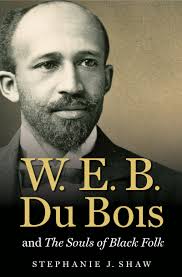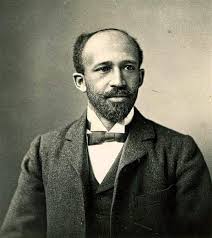The Souls of Black Folk Page #7
The Souls of Black Folk is a 1903 work of American literature by W. E. B. Du Bois. It is a seminal work in the history of sociology and a cornerstone of African-American literature. The book contains several essays on race, some of which the magazine Atlantic Monthly had previously published.
To understand and criticise intelligently so vast a work, one must not forget an instant the drift of things in the later sixties. Lee had surrendered, Lincoln was dead, and Johnson and Congress were at loggerheads; the Thirteenth Amendment was adopted, the Fourteenth pending, and the Fifteenth declared in force in 1870. Guerrilla raiding, the ever-present flickering after-flame of war, was spending its forces against the Negroes, and all the Southern land was awakening as from some wild dream to poverty and social revolution. In a time of perfect calm, amid willing neighbors and streaming wealth, the social uplifting of four million slaves to an assured and self-sustaining place in the body politic and economic would have been a herculean task; but when to the inherent difficulties of so delicate and nice a social operation were added the spite and hate of conflict, the hell of war; when suspicion and cruelty were rife, and gaunt Hunger wept beside Bereavement,—in such a case, the work of any instrument of social regeneration was in large part foredoomed to failure. The very name of the Bureau stood for a thing in the South which for two centuries and better men had refused even to argue,—that life amid free Negroes was simply unthinkable, the maddest of experiments. The agents that the Bureau could command varied all the way from unselfish philanthropists to narrow-minded busybodies and thieves; and even though it be true that the average was far better than the worst, it was the occasional fly that helped spoil the ointment. Then amid all crouched the freed slave, bewildered between friend and foe. He had emerged from slavery,—not the worst slavery in the world, not a slavery that made all life unbearable, rather a slavery that had here and there something of kindliness, fidelity, and happiness,—but withal slavery, which, so far as human aspiration and desert were concerned, classed the black man and the ox together. And the Negro knew full well that, whatever their deeper convictions may have been, Southern men had fought with desperate energy to perpetuate this slavery under which the black masses, with half-articulate thought, had writhed and shivered. They welcomed freedom with a cry. They shrank from the master who still strove for their chains; they fled to the friends that had freed them, even though those friends stood ready to use them as a club for driving the recalcitrant South back into loyalty. So the cleft between the white and black South grew. Idle to say it never should have been; it was as inevitable as its results were pitiable. Curiously incongruous elements were left arrayed against each other,—the North, the government, the carpet-bagger, and the slave, here; and there, all the South that was white, whether gentleman or vagabond, honest man or rascal, lawless murderer or martyr to duty. Thus it is doubly difficult to write of this period calmly, so intense was the feeling, so mighty the human passions that swayed and blinded men. Amid it all, two figures ever stand to typify that day to coming ages,—the one, a gray-haired gentleman, whose fathers had quit themselves like men, whose sons lay in nameless graves; who bowed to the evil of slavery because its abolition threatened untold ill to all; who stood at last, in the evening of life, a blighted, ruined form, with hate in his eyes;—and the other, a form hovering dark and mother-like, her awful face black with the mists of centuries, had aforetime quailed at that white master’s command, had bent in love over the cradles of his sons and daughters, and closed in death the sunken eyes of his wife,—aye, too, at his behest had laid herself low to his lust, and borne a tawny man-child to the world, only to see her dark boy’s limbs scattered to the winds by midnight marauders riding after “damned Niggers.” These were the saddest sights of that woful day; and no man clasped the hands of these two passing figures of the present-past; but, hating, they went to their long home, and, hating, their children’s children live today. Here, then, was the field of work for the Freedmen’s Bureau; and since, with some hesitation, it was continued by the act of 1868 until 1869, let us look upon four years of its work as a whole. There were, in 1868, nine hundred Bureau officials scattered from Washington to Texas, ruling, directly and indirectly, many millions of men. The deeds of these rulers fall mainly under seven heads: the relief of physical suffering, the overseeing of the beginnings of free labor, the buying and selling of land, the establishment of schools, the paying of bounties, the administration of justice, and the financiering of all these activities. Up to June, 1869, over half a million patients had been treated by Bureau physicians and surgeons, and sixty hospitals and asylums had been in operation. In fifty months twenty-one million free rations were distributed at a cost of over four million dollars. Next came the difficult question of labor. First, thirty thousand black men were transported from the refuges and relief stations back to the farms, back to the critical trial of a new way of working. Plain instructions went out from Washington: the laborers must be free to choose their employers, no fixed rate of wages was prescribed, and there was to be no peonage or forced labor. So far, so good; but where local agents differed toto cælo in capacity and character, where the personnel was continually changing, the outcome was necessarily varied. The largest element of success lay in the fact that the majority of the freedmen were willing, even eager, to work. So labor contracts were written,—fifty thousand in a single State,—laborers advised, wages guaranteed, and employers supplied. In truth, the organization became a vast labor bureau,—not perfect, indeed, notably defective here and there, but on the whole successful beyond the dreams of thoughtful men. The two great obstacles which confronted the officials were the tyrant and the idler,—the slaveholder who was determined to perpetuate slavery under another name; and, the freedman who regarded freedom as perpetual rest,—the Devil and the Deep Sea.
Translation
Translate and read this book in other languages:
Select another language:
- - Select -
- 简体中文 (Chinese - Simplified)
- 繁體中文 (Chinese - Traditional)
- Español (Spanish)
- Esperanto (Esperanto)
- 日本語 (Japanese)
- Português (Portuguese)
- Deutsch (German)
- العربية (Arabic)
- Français (French)
- Русский (Russian)
- ಕನ್ನಡ (Kannada)
- 한국어 (Korean)
- עברית (Hebrew)
- Gaeilge (Irish)
- Українська (Ukrainian)
- اردو (Urdu)
- Magyar (Hungarian)
- मानक हिन्दी (Hindi)
- Indonesia (Indonesian)
- Italiano (Italian)
- தமிழ் (Tamil)
- Türkçe (Turkish)
- తెలుగు (Telugu)
- ภาษาไทย (Thai)
- Tiếng Việt (Vietnamese)
- Čeština (Czech)
- Polski (Polish)
- Bahasa Indonesia (Indonesian)
- Românește (Romanian)
- Nederlands (Dutch)
- Ελληνικά (Greek)
- Latinum (Latin)
- Svenska (Swedish)
- Dansk (Danish)
- Suomi (Finnish)
- فارسی (Persian)
- ייִדיש (Yiddish)
- հայերեն (Armenian)
- Norsk (Norwegian)
- English (English)
Citation
Use the citation below to add this book to your bibliography:
Style:MLAChicagoAPA
"The Souls of Black Folk Books." Literature.com. STANDS4 LLC, 2025. Web. 23 Feb. 2025. <https://www.literature.com/book/the_souls_of_black_folk_310>.








Discuss this The Souls of Black Folk book with the community:
Report Comment
We're doing our best to make sure our content is useful, accurate and safe.
If by any chance you spot an inappropriate comment while navigating through our website please use this form to let us know, and we'll take care of it shortly.
Attachment
You need to be logged in to favorite.
Log In